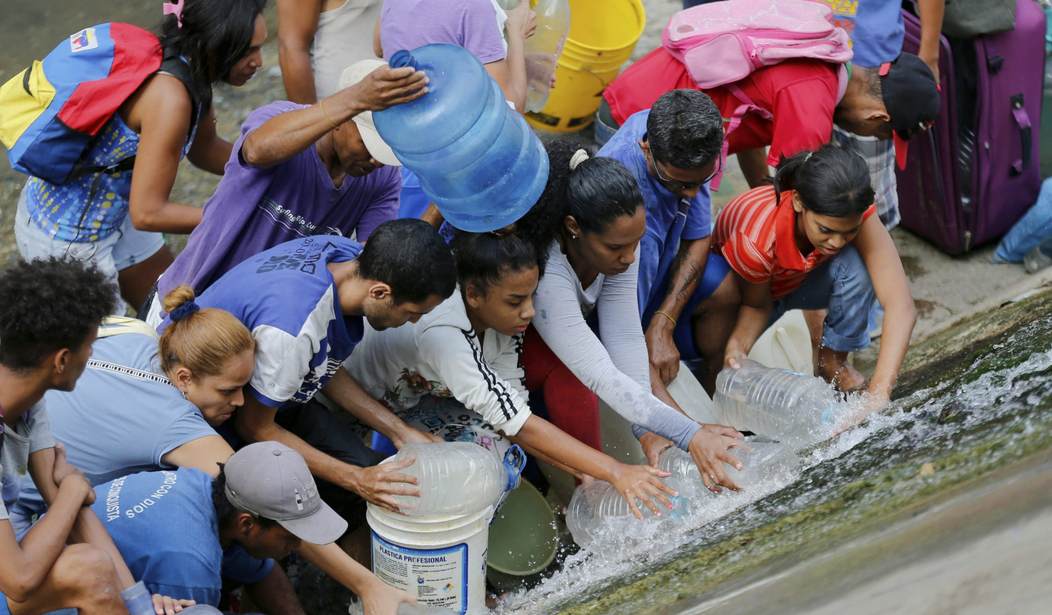The inability of the Maduro regime to restore power supplies to more than an intermittent fraction of Venezuela’s population has provided the 21st Century with its first glimpse of what a network collapse can do to a modern society. The EMP Commission Report anticipated civilization’s increasing dependency on electric power, telecommunication, banking, fuel, transportation, food distribution, water supply and emergency services grids. They concluded that if these crashed our seemingly solid world could come tumbling down faster than we think.
Nearly a week after the Guri Dam, which provides most of Venezuela’s base electric load, broke down, people are drinking from sewers, patients are dying in hospitals, prisoners are starving in their cells, gasoline is running out at stations from lack of distribution, food is rotting in the reefers and looting has become widespread. All cascaded from a fault that until now has not yet been fully explained. One Venezuelan described the day the grid died almost as if civilization were in the past tense:
I left the office on Thursday afternoon and when I got home the lights were out. I stopped by one of my neighbor’s apartment and we had a few beers while we waited for the power to come back on. Three days later, we still have no water, no electricity, no food, no cash and no explanations (or help whatsoever) from the authorities.
Since then, the country has turned into a ghost town. Survivors roam the empty streets looking for mobile signal, food, water, and a plug. Most stores remain closed; they say hundreds have died in public hospitals or at their homes, unable to contact anyone for help; fear has conquered the streets; looting and small protests have been reported across the nation; fires have gotten out of control. Every hour that goes by without electricity, everything gets harder to find, more expensive, scarier and sadder.
Reports describing widespread looting in Maracaibo suggest the Venezuelan state has in parts disintegrated. The only crowd control left, if the YouTube videos posted are representative, are the drive-by shootings by the Chavista colectivo militias who show up on motorcycles at sites of unrest and fire into the air like Wild West cowboys before zooming off. That’s it. That’s the Bolivarian state.
The situation has the air of a zombie movie. What happens when Venezuela winds down — when there aren’t any more groceries, bread, gasoline and comestibles left to loot — is the 64 billion dollar question. One tweet has already referred to Maracaibo as the capital of “The Walking Dead” and another called it “Raccoon City” because of the atmospheric similarities. The Venezuelan first-person account continues:
Despair is in the air. “We have seen a lot of crazy shit these past 20 years,” says Antonio, a 54-year-old butcher from Falcón. “But we had never experienced anything close to this. They turned off the lights and simply walked out the door. No help is coming. This is what losing a war must feel like. Aren’t they going to help us with water? With food? How much longer until people start dropping dead in the streets?”
Maria walks slowly with a cane, the last rays of sunshine warming her skin. “I am sad it had to happen like this, when we were so close to the end of this damned government. I have a knee problem. I have to walk 17 km to get home. I have a long way to go. When I get there, I won’t have food or water. I don’t even know if my family will be there. If they are, I won’t know how to feed them. And if they aren’t there, I won’t know how to find them.”
Even an authoritarian state can collapse from cascading chaos as their guns are powerless against this ineffable foe. It’s tempting when looking at Venezuela to think “it can’t happen here.” Yet if history teaches anything it is that collapse can suddenly overtake seemingly solid societies. After all, the average civilization lasts 340 years. “More than 99 percent of all species, amounting to over five billion species, that ever lived on Earth are estimated to have died out.” Realistic leaders always knew that survival depended on a civilization’s adaptability and a design margin against some unpredictable shock rather than some guarantee from the Arc of History. Venezuela’s socialist leadership made the mistake of thinking Darwin no longer applied to them. They were in control; they could predict and plan the future; they could even change human behavior. In so doing they created single points of failure whose collapse is still unfolding.
Yet the appeal of socialism in the West is likely to remain undiminished. To prosperous Americans and Europeans it sounds good and Maracaibo is in a galaxy far, far away. “Sanders should deliver a detailed speech that chronicles exactly where Maduro went wrong, and why he does not deserve the moniker of ‘socialist’ … He should excoriate Venezuela for remaining dependent on oil revenue, creating a rickety economy that harms the planet,” advised Politico. Alexandria Ocasio-Cortez says”we must overhaul America’s ‘garbage’ status quo, which is enslaved to ‘irredeemable’ capitalism” without the slightest sense of irony that it is capitalism that will soon be called on to re-energize Venezuela.
Venezuela’s collapsed networks will borrow on the design margin of other countries. The question is whether that might not also be wasted as well. “The second reason for risk blindness,” continues the Harvard BusinessReview, “relates to sunk costs … we continue to throw good money after bad.” The 16 Democratic lawmakers (among them Alexandria Ocasio-Cortez) argued that “the U.S. should instead join other countries in promoting Venezuelan efforts to achieve constructive dialogue and democratic solutions to the current political crisis.”
Help them fix Venezuela, in other words. They haven’t quite grasped that the region is on the hook already. The external resources needed not only to “blackstart” Venezuela’s power grid but salvage the country itself can come from nowhere else but other people’s money:
Reenergizing a dead grid, a process known as a black start, is challenging any under circumstances … “The challenge with black start is always just knowing specifically what happened,” says Nathan Wallace, director of cyber operations and a staff engineer at secure grid companies Cybirical and Ampirical Solutions … If the procedure for black start is not accurately representing the state of the system, there can be problems.”
And the problem with millennial ideologies is they almost never accurately represent the state of the system. They are constructions of fantasy yet not above appealing to sunk costs. Someone has to provide the rescue money which they may never repay. The main argument for America not intervening in Venezuela is that it’s dangerous to come into contact with chaos.
Maduro’s neighbors, overwhelmed by refugees, are naturally trying to firewall themselves from trouble. Recently Argemiro Maduro, the president’s cousin, was turned back with his family at the Colombian border. He was trying to flee the heat and discomfort caused by the lack of power and water in his own collapsing society. But about the millions of desperate people that will follow in his wake? No man is an island. Not in our networked, failure-prone world.
Tip Jar or Subscribe or Unsubscribe to the Belmont Club
Follow Wretchard on Twitter
For a list of books most frequently purchased by readers, visit my homepage.
Support the Belmont Club by purchasing from Amazon through the links below.
Books:
Survival Wisdom & Know-How: Everything You Need to Know to Subsist in the Wilderness, by The Editors of Stackpole Books. A complete, all-in-one survival guide, with information on every aspect of outdoor life and adventure, from orienteering to campfire cooking to ice climbing and beyond. A massive collection of wilderness know-how that leaves absolutely nothing to chance when it comes to surviving and thriving in the wilderness, and appreciating every minute of it.
Democracy: A Case Study, by David Moss. Through nineteen case studies, Harvard Business School professor David Moss delivers not only a first-rate history of the United States but also reveals that the nation has often thrived on conflict. Each case presents readers with a pivotal moment in U.S. history, asks them to weigh the choices and consequences, wrestle with momentous decisions, and come to their own conclusions. The reader comes away from this engaging book with a new appreciation of the country’s extraordinary resilience.
Dead Mountain: The Untold True Story of the Dyatlov Pass Incident, by Donnie Eichar. In February 1959, a group of nine experienced hikers in the Russian Ural Mountains died mysteriously on an elevation known as Dead Mountain. Eerie aspects of the incident — unexplained violent injuries, signs that they cut open and fled the tent without proper clothing or shoes, a strange final photograph taken by one of the hikers, and elevated levels of radiation found on some of their clothes — have led to decades of speculation over what really happened. This gripping book tries to solve the mystery, using the hikers’ own journals and photographs, rarely seen government records, dozens of interviews, and the author’s retracing of the hikers’ fateful journey in the Russian winter.
The Inevitable: Understanding the 12 Technological Forces That Will Shape Our Future, by Kevin Kelly. Kelly provides an optimistic road map for the future, showing how the coming changes in our lives can be understood as the result of a few long-term, accelerating forces already in motion. These deep trends – interacting, cognifying, flowing, screening, accessing, sharing, filtering, remixing, tracking, and questioning — will completely revolutionize the way we buy, work, learn, and communicate with each other. By understanding and embracing them, says Kelly, it will be easier for us to navigate these changes in ways that will benefit us. For those who seek guidance on where their business, industry, or life is heading – what to invent, where to work, what to invest in, how to better reach customers, and what to begin to put in place – this book is indispensable.
For a list of books most frequently purchased by readers, visit my homepage.
Did you know that you can purchase some of these books and pamphlets by Richard Fernandez and share them with your friends? They will receive a link in their email and it will automatically give them access to a Kindle reader on their smartphone, computer or even as a web-readable document.
The War of the Words, Understanding the crisis of the early 21st century in terms of information corruption in the financial, security and political spheres
Rebranding Christianity, or why the truth shall make you free
The Three Conjectures, reflections on terrorism and the nuclear age
Storming the Castle, why government should get small
No Way In at Amazon Kindle. Fiction. A flight into peril, flashbacks to underground action.
Storm Over the South China Sea, how China is restarting history in the Pacific.










Join the conversation as a VIP Member